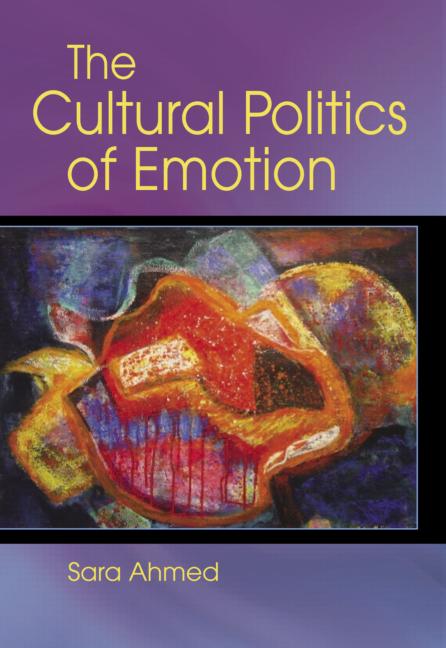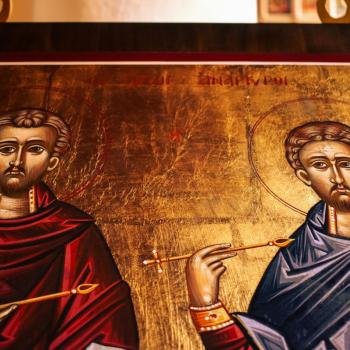John 20:19-31
There’s a country song that insists “Somebody done somebody wrong.” The church has done “some-bodies” (lots-of-bodies) wrong over the centuries. The emphasis here is on “bodies” because our culture likes to pride itself on the body even while the culture war has harshly judged bodies that are not male, straight, and rich. The new culture war is against trans people. Do you think that we ever realize how many people have their identity, dignity, their very hold on life, liberty, and the pursuit of happiness pressed into a partisan battle and fashioned into a political weapon? In the name of what we think is good, we can do a lot of damage.

Affect Theory
www.amazon.com
Sara Ahmed, a British-Australian scholar whose area of study includes feminism, lesbian feminism, queer theory, and affect theory, has this fabulous book, The Cultural Politics of Emotion. When it comes to the world of reading, we preaching need to get out in the larger world more often. Ahmed develops the concept of “stickiness.” She argues that feelings “stick” to people. She shows how the emotional treatment we impose on some people accumulates over time and “sticks” to them, especially when the feelings are negative, demeaning, prejudiced. I think there’s an obvious case of “stickiness” in the story of Thomas. I’m sure Thomas won’t mind me using feminist, lesbian, queer theory in his defense; he has been kicked around by straight male preachers for centuries.
Thomas has been the object of this kind of “stickiness” and “being done wrong.” He has been used by preachers in search of a sermon illustration. They labeled him “Doubting” Thomas. There are people who are experts at identifying vulnerable, marginalized people and demonizing them in return for political gain.
John tells the story and the idea of “doubt” sticks to Thomas. Keep in mind John also tells the story of racing Peter to the empty tomb and “winning the race.” Sibling rivalry among disciples? Salary envy among pastors? And John refers to himself as “the disciple Jesus loved.” John didn’t say Thomas was a doubter, but he planted the seed.
Plenty of preachers gladly followed John’s lead over the centuries, enough for the charge to stick for the entire history of the church.
Look, Jesus did not give Thomas the nickname, “Doubting Thomas.” When Jesus gave a nickname, it was an uplifting, filled with promise and potential. “You are Simon; You are to be called ‘Rock.”
Later, P:eter denied Jesus three times, but he became known as the rock on which the church was built, the leader, the first pope. Thomas expressed some confusion about the resurrected Lord, and he got stuck with “doubting Thomas.” Now, do you see?
“Doubting Thomas” has such a contemporary ring to it. Giving people harsh nicknames has become an art form in our politics. The political theatre has become a tragedy pretending to be a comedy. What concerns me is that so many millions of Americans laugh and enjoy the way we are now attacking and demeaning and putting one another down. People use nicknames to hurt and degrade people. And at least 48% of Americans like negative nicknames.
The church ought not be in the name calling game. In the church, we are in the new name business.
By now you can tell, “Doubting Thomas” disturbs. No one calls Peter “Denying Peter” or “King of Denial”. No one says “Sticky Fingers” Matthew. No one says “Hot-headed James and John,” but they were dubbed the “Sons of Thunder.” No one says “Elitist” John because he was a philosopher. No one says “Smelly” Andrew because he was a fisherman. Thomas, of the 12, only Thomas, gets a low-grade, demeaning nickname and he doesn’t deserve it.
I want us to give Thomas and one another a serious break. His was not unbelieving doubt. It was honest, emotional, anguished, “I want to believe” doubt. He blurted out what he was thinking. Impulsive. Normal. A natural person. This was “I believe, help my unbelief” doubt. Don’t we know honest doubt is always mixed with faith? “God bless Thomas” not “God damn Thomas.”

Cottonbro Studio
When I see Thomas glaring out at our faces from the Upper Room, I see him wondering why the Church has so mistreated him. And with such glee. We look like those grainy photos from the 1920’s of a lynching crowd gathered to lynch an innocent African American, grinning, and having a good old time, with a church choir singing, “Shall We Gather at the River.”
There’s more to Thomas than his Upper Room moment. After Jesus learned of the death of Lazarus, he determined to go back to Bethany. The disciples tried to dissuade him because his enemies there were seeking to kill him, but Thomas says, “Let us go also, that we may die with him.” Why didn’t we name him “Loyal Thomas”
When Jesus said, “You know the way to the place where I am going,” it was Thomas who said to him, “Lord, we do not know where you are going. How can we know the way?” Why haven’t we called him “Seeking Thomas” or “Philosopher Thomas” or “Questioning Thomas”? There’s so much more to Thomas than doubt. The church needs skeptics, doubters, people with serious questions or we tend to get hard to put up with on a daily basis.
And then there’s this special moment: Jesus comes back for Thomas. “Jesus came and stood among them.” So when Thomas missed church, Jesus came back for him at the next meeting. Jesus comes for the doubters, the skeptics, the unbelievers. Jesus meets Thomas bearing his doubts into church. “Do not doubt but believe.” Thomas cries, “My Lord and my God.” Give me a thousand men and women like Thomas: MY LORD AND MY GOD!
Is it just me or should this gigantic expression of faith stand next to Peter declaring, “You are the son of the living God”? I think the time has come to call him “Honest” Thomas.
Here’s what I’m struggling to make clear. Jesus isn’t upset, uptight, or bent out of shape by Thomas. I am reminded of all the preachers who are besides themselves with righteous indignation over gays, women in ministry, immigrants, persons of color, and people they deem as “less than.” I’m saying, as Jesus received Thomas, as Jesus gave Thomas the sign of peace, Jesus does the same to all the people who have been victims of the moralistic judgment of so many Christians for so many centuries. And they keep doing it, they claim, because it is orthodox Christianity. It never dawns on them orthodoxy has started out at times on the wrong foot and been wrong all these centuries.
We can let go of “Doubting” Thomas and all that name calling and condemnation. We can pass out the Easter gifts that Jesus gave to Thomas: Peace, Purpose, and Power. Leave your bag of old doubts at the altar and receive the gifts of Easter. Amen













